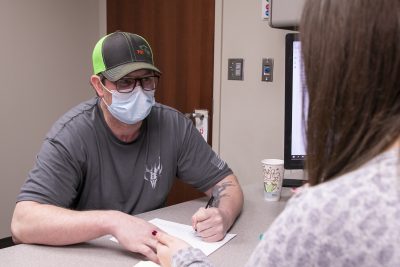On the day of his first appointment, his mom wheelchaired him to the door. When he spoke, he used one-word answers, mostly “no” and sometimes “yes.”
Today, his progress is a “wow.”
Josh Brown, 41, crashed a 4-wheeler two years ago. The accident left him unable to walk or talk. He remembers nothing – not the surgeries, not the moves from Kansas (where he was living and working) to Nebraska, Iowa, back to Kansas and then home to Jamestown. Brown graduated from Jamestown High School in 1998.
He doesn’t remember, but his mother does.
Rhonda Ferguson remembers the phone call. She remembers the date too – April 7, 2020. Rhonda knows the date of every surgery, every move to a new hospital and every time Brown’s care teams felt his progress had plateaued. She remembers the date in June 2020 too, when in a Zoom call, she noticed he “started going backwards. There was something wrong.”
She was right. Heightened pressure on his brain nearly cost Brown his life.
“We almost lost him,” she said.
FROM “NO” TO “WOW”
Brown may have lost his memory, but he found a higher power.
“The Lord is my savior,” Brown said. “The Lord and my mom.”
Brown transferred his care to Jamestown Regional Medical Center on Aug. 2, after both inpatient and outpatient rehabilitation services in three Nebraska and Iowa hospitals. When he hit a plateau, his therapists there said they could do no more.
“I’m ornery enough,” Ferguson said. “I said ‘oh no, he needs more help than that.’”
In October of 2021, Ferguson purchased a handicap-accessible van to take Josh to therapies. Her daughters encouraged her to enlist the care of the rehabilitation department at JRMC.
Today, Brown receives six hours of therapy each week — speech, physical and occupational. From there, he exercises at Anytime Fitness in Jamestown, to continue his progress.
In April 2021, Brown could not stand or even sit up. His brain injury limited his ability to speak. Six months and 40 visits later, Brown can swim with his son, shovel driveways, slice vegetables and enjoy hunting and fishing. His communication has improved too – to the point that he jokingly gives his therapy team a bad time.
“He’s getting sassy,” Physical Therapist Paula Marker said with a smile. “It’s fair that he teases me. I work him hard. He does things that even I can’t do.”
Marker attributes Brown’s success to his attitude and support system.
“Our therapy team is just amazed,” she said. “His whole family, they are dedicated to him and it shows. His mom is the kind of advocate we all would want, if ever we were in the same situation.”
HARD WORK AND POSITIVITY
Brown’s progress is “astonishing,” said Speech Therapist Lauren Burningham.
Burningham credits Brown’s therapeutic family and positive attitude.

“He’s hard-working and motivated to get to his goal,” she said. “He’s got really big dreams.”
Occupational Therapist Amy Walz helps Brown learn and re-learn basic living tasks like reading, writing, vacuuming, counting money, paying bills and managing medications.
She sees Brown’s sassiness as a sign of success.
“When people do that, it means they’re feeling better and getting better,” she said.
Though his therapy team credits his family and attitude for his progress, his family credits an additional piece of the puzzle.
“Paula, Amy and Lauren – they worked miracles,” Ferguson said.
Marker said the therapy team has the autonomy to give individualized care, which is what Brown needed.
“I’ve worked for several organizations,” she said. “JRMC’s culture and clinical standards are the best I’ve experienced. JRMC trusts me and provides the tools I need to offer very good care to Josh and all our patients.”
Walz agreed.
THE DREAM TEAM
“JRMC is a Best Place to Work. That translates into better patient care because our teams communicate well and work together on big-picture patient goals as well as day-to-day ones.”
In the rehabilitation department, for example, Admissions Clerks Pam Swenson and Mikaela Pethel offer greetings and warm welcomes to patients and their guests. They get to know patients as people, Walz said.
That warmness helps people heal, Walz said, because people feel comfortable rather than nervous.
“The collaboration of our teams enhances the quality of the care we can give,” she said.
As he recovers, Brown’s plans are to re-learn to drive, return to work and return to Kansas and his 10-year-old son.
Ferguson’s voice cracks when she thinks about her son’s progress.
“It never entered my mind that he wasn’t going to get this far. We’ve come a long way,” Ferguson said. “We’ll see what happens next.”
LEARN MORE


